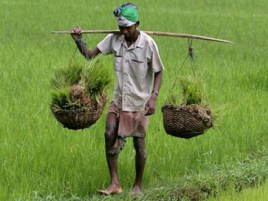Globalization Destroys Rural Communities Worldwide
By Vandana Shiva | Nov 14, 2010

Recently, I was visiting Bhatinda in Punjab because of an epidemic of farmers suicides. Punjab used to be the most prosperous agricultural region in India. Today every farmer is in debt and despair. Vast stretches of land have become water-logged desert. And as an old farmer pointed out, even the trees have stopped bearing fruit because heavy use of pesticides have killed the pollinators – the bees and butterflies.
And Punjab is not alone in experiencing this ecological and social disaster. Last year I was in Warangal, Andhra Pradesh where farmers have also been committing suicide. Farmers who traditionally grew pulses and millets and paddy have been lured by seed companies to buy hybrid cotton seeds referred to by the seed merchants as “white gold”, which were supposed to make them millionaires. Instead they became paupers.
Their native seeds have been displaced with new hybrids which cannot be saved and need to be purchased every year at high cost. Hybrids are also very vulnerable to pest attacks. Spending on pesticides in Warangal has shot up 2000 per cent from $2.5 million in the 1980s to $50 million in 1997. Now farmers are consuming the same pesticides as a way of killing themselves so that they can escape permanently from unpayable debt.
The corporations are now trying to introduce genetically engineered seed which will further increase costs and ecological risks. That is why farmers like Malla Reddy of the Andhra Pradesh Farmers’ Union had uprooted Monsanto’s genetically engineered Bollgard cotton in Warangal.
On March 27th, 25 year old Betavati Ratan took his life because he could not pay pack debts for drilling a deep tube well on his two-acre farm. The wells are now dry, as are the wells in Gujarat and Rajasthan where more than 50 million people face a water famine.
The drought is not a “natural disaster”. It is “man-made”. It is the result of mining of scarce ground water in arid regions to grow thirsty cash crops for exports instead of water prudent food crops for local needs.
It is experiences such as these which tell me that we are so wrong to be smug about the new global economy. I will argue in this lecture that it is time to stop and think about the impact of globalisation on the lives of ordinary people. This is vital to achieve sustainability.
Seattle and the World Trade Organisation protests last year have forced everyone to think again. Throughout this lecture series people have referred to different aspects of sustainable development taking globalisation for granted. For me it is now time radically to re-evaluate what we are doing. For what we are doing in the name of globalisation to the poor is brutal and unforgivable. This is specially evident in India as we witness the unfolding disasters of globalisation, especially in food and agriculture.
Who feeds the world? My answer is very different to that given by most people.















